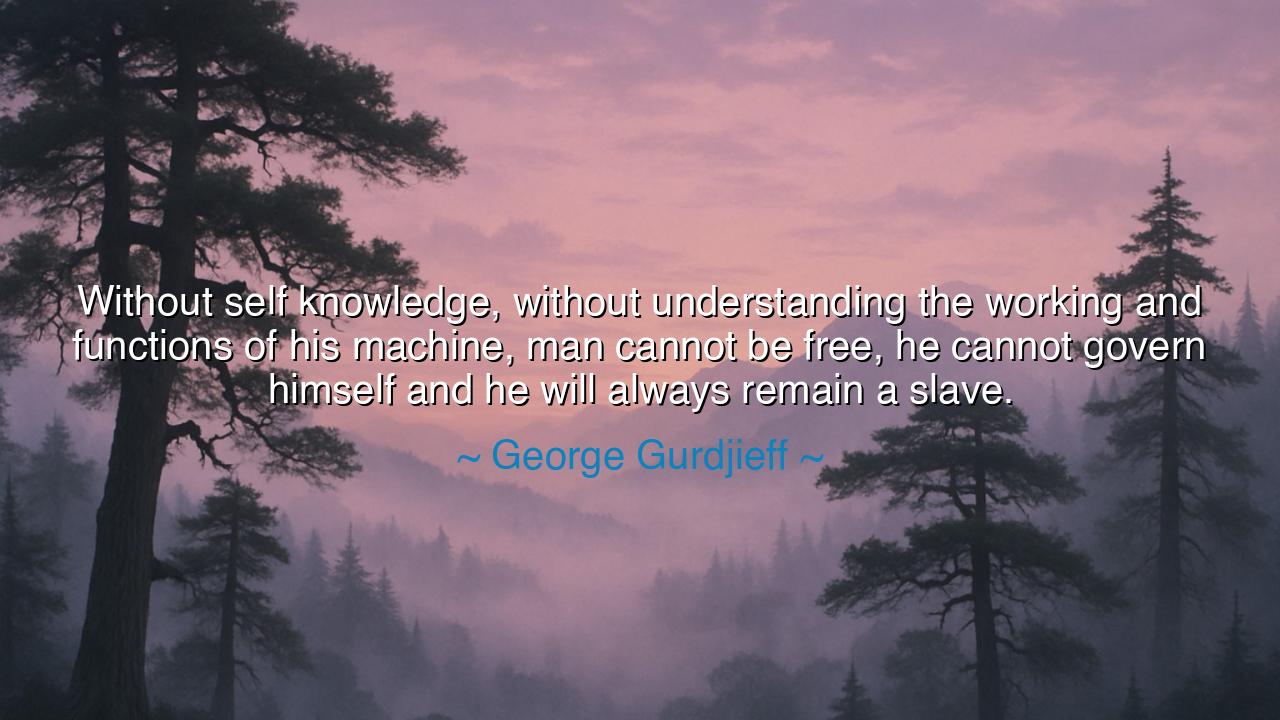
Without self knowledge, without understanding the working and
Without self knowledge, without understanding the working and functions of his machine, man cannot be free, he cannot govern himself and he will always remain a slave.






Hear the solemn wisdom of George Gurdjieff, the mystic and teacher of inner transformation, who declared: “Without self knowledge, without understanding the working and functions of his machine, man cannot be free, he cannot govern himself and he will always remain a slave.” These words resound like a trumpet call across the ages, reminding us that the greatest chains are not forged of iron, but of ignorance. The man who does not know himself is bound, though no jailer holds him, and the woman who does not understand her own nature is shackled, though no lock restrains her.
What is this self knowledge of which Gurdjieff speaks? It is not the shallow recognition of one’s name, one’s habits, one’s fleeting desires. It is the deep and unflinching gaze into the soul—the understanding of how thoughts arise, how emotions command, how impulses move the body like strings upon a puppet. To Gurdjieff, man is a machine when he lives without awareness, reacting blindly to circumstance, pushed by fear, pulled by craving, driven by forces he does not master. Such a man calls himself free, but his freedom is illusion, for he dances to tunes he does not hear and obeys masters he does not see.
Consider the life of Marcus Aurelius, emperor of Rome. Surrounded by power, temptation, and war, he might have lived as a slave to glory, wrath, or indulgence. Yet through the discipline of philosophy, he turned inward, seeking to know the motions of his soul. In his Meditations, he examined his impulses as a physician examines the body. By such self knowledge, he governed not only his empire but himself. And this mastery was his true freedom—for no ambition, no fear, no despair could rule him. He shows us the truth of Gurdjieff’s words: that the one who knows the workings of his own mind cannot be enslaved, for he has made himself sovereign.
But look also to history’s tragedies, when leaders and peoples alike lived without self knowledge. How many kings destroyed their kingdoms because they mistook pride for strength, vengeance for justice, desire for wisdom? How many societies crumbled because their people were enslaved not by conquerors, but by their own appetites, blinded to their own weaknesses? The fate of those who refuse to understand themselves is ever the same: to be governed from without, to stumble like sleepers in the dark, and to call it living.
To understand Gurdjieff’s teaching is to see that freedom begins within. Political liberty, wealth, or leisure mean little if a man is not master of his own machine. The tyrant within—the restless thought, the unexamined impulse, the storm of ungoverned passion—is often fiercer than any tyrant without. Only by bringing light into these hidden chambers does a person become whole. Only by understanding the forces that move him does he cease to be their captive.
The lesson, then, is this: seek self knowledge with the same fervor that others seek gold or glory. Examine your mind; learn its patterns, its strengths, its weaknesses. Watch how anger arises and how desire commands. Ask yourself, “Am I choosing, or am I being driven?” In such reflection lies the key to mastery. The one who understands his own nature may stumble, but he will not be enslaved; he may suffer, but he will not be broken.
Therefore, in your daily life, make this your practice: take moments of stillness, where you observe yourself as though from afar. Write down your impulses and see what governs them. Train your body with discipline, for it is the vessel of your mind. Train your thoughts with silence, for they are the engine of your being. In this way, step by step, you will cease to be a machine moved by unseen hands, and you will become the master of yourself. And the one who governs himself is truly free, for no outer power can enslave the soul that has awakened to itself.






AAdministratorAdministrator
Welcome, honored guests. Please leave a comment, we will respond soon